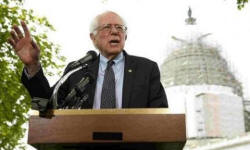|
 U.S.
presidential hopeful Sanders: Break up the big banks U.S.
presidential hopeful Sanders: Break up the big banks
 Send a link to a friend
Send a link to a friend
[May 06, 2015]
By Douwe Miedema
WASHINGTON (Reuters) - Bernie Sanders, a
self-described socialist U.S. senator who has launched a bid for the
2016 Democratic presidential nomination, said on Tuesday he will
introduce a bill to break up the biggest banks, a position far to the
left of the party's front runner, Hillary Clinton.
|
|
 Calls for Wall Street's largest firms to be cut down were numerous
after taxpayers spent billions of dollars to prevent the financial
system from collapse during the 2007-09 financial crisis, but they
have since gradually died down. Calls for Wall Street's largest firms to be cut down were numerous
after taxpayers spent billions of dollars to prevent the financial
system from collapse during the 2007-09 financial crisis, but they
have since gradually died down.
Sanders faces long odds against Clinton's fund-raising might, and
his views might help position the former secretary of state and
first lady more as a moderate and buttress her efforts to attract
money from banks' deep pockets.
Under the Sanders proposal, regulators on the existing Financial
Stability Oversight Council would compile a list of institutions
that are 'too big to fail' and implicitly rely on government support
during a crisis.
"If an institution is too big to fail, it is too big to exist,"
Sanders said in a statement.
 Within a year of enactment of the bill, the Treasury secretary would
be required to break up these firms. They would also be prohibited
from using any customer funds for risky or speculative activities on
financial markets.
Sanders, an independent from Vermont, launched his long-shot bid
last week, highlighting his fight against authorizing the Iraq war,
which Clinton voted to authorize as a senator, and putting pressure
on her political agenda from the left.
Sanders is not alone in his view that large banks still pose an
undue risk to the economy after causing the worst economic crisis
since the Great Depression.
[to top of second column] |

Senator Elizabeth Warren, a highly visible Democrat from
Massachusetts, also wants to break up big banks. Among regulators,
Tom Hoenig, second-in-command at the powerful Federal Deposit
Insurance Corporation, wants the same thing.
Still, the bill stands a near-zero chance of becoming law.
Representative Brad Sherman, a Democrat from California, also backed
the bill, but it has no Republican support. Republicans hold the
majority in both houses of Congress.
President Barack Obama is also opposed to making any changes to the
2010 Dodd-Frank law aimed at reforming Wall Street.
(Reporting by Douwe Miedema; Editing by Dan Grebler)
[© 2015 Thomson Reuters. All rights
reserved.]
Copyright 2015 Reuters. All rights reserved. This material may not be published,
broadcast, rewritten or redistributed.
 |